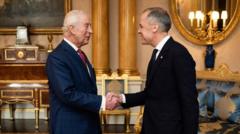In a bold gesture reflecting Canada's evolving relationship with the monarchy, Prime Minister Mark Carney has officially invited King Charles III to open the 45th session of Canadian parliament. This significant move comes on the heels of Carney’s election, emphasizing Canada’s distinct identity amidst ongoing tensions with the US.
Historically, Canada's relationship with the British monarchy has been complex. Past leaders like Stephen Harper sought to reinforce connections to the Crown, prompting controversy. In contrast, Liberal leaders, including Justin Trudeau, shifted focus towards independence, often downplaying royal ties. Today, with increasing scrutiny on the monarchy, Carney’s invitation signals a shift back towards royal appreciation as a strategic stance against former President Trump's perceived undermining of Canadian sovereignty.
The King’s visit, his first as reigning monarch, is anticipated to be a rare occasion: the last time a British monarch opened a Canadian parliament was in 1957. Carney framed this visit as a "historic honour," representing a stand for Canada's sovereignty, especially significant as Trump previously labeled Canada as a potential “51st state.”
While many Canadians feel indifference towards the monarchy, Carney's approach aims to solidify international alliances, particularly with Europe, as Canada navigates a dynamic global landscape. This visit is not only pivotal for Canada’s political narrative but also could enhance Prime Minister Carney’s relationship with Trump, who has expressed admiration for the British monarchy.
As the royal visit approaches, both history and modern politics converge, promising a moment that transcends mere pageantry; it embodies Canada's assertion of identity on the world stage.



















